De Nederlandse dichter Alexis de Roode werd geboren op 8 oktober 1970 in Hulst. Zie ook alle tags voor Alexis de Roode op dit blog.
Dag liefje
Dit gedicht is andersom,
want alles is voorbij.
Het wordt al lente en
ik moet weg van hier.
Het mooie van de tijd is
dat hij doorgaat, trouwer dan mensen.
Zo verdwijnt ook alle pijn.
Zing maar met de vogels
die slecht weinig jaren hebben.
Dag liefje,
Sommige dingen heb ik nooit
gezegd, maar wel altijd gedacht.
Ik weet nog dat ik je zag
voor het eerst, in een zweefmolen,
je had een potlood in je haar.
Uit: Gratis tijd voor iedereen.
Elf witte gedaanten / in duisternis
Adem en ruis / onder zware gewelven
Diep in de zalen / flakkerend rood
Achter de stilte / één kleine vlam
Stenen plavuizen / glanzend van leegte
Roerloos rechtop / monnik en touw
Dunne witte armen / glijden uit plooien
Traag als gebeden / omhoog langs het koord
Een knallende slag / wordt ronde galm
Sterft eenzaam uit / in zuigende stilte
De ruimte staat op / dan nogmaals een dag
Tien witte gestalten / schuifelden weg
Alleen blijft de monnik / met dreunend lawaai
In de doodstille kerk / absoluut silhouet
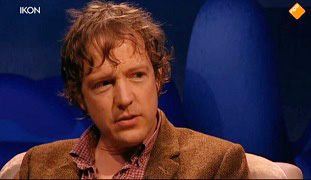
Alexis de Roode (Hulst, 8 oktober 1970)
De Nederlandse schrijver en journalist Martin van Amerongen werd geboren op 8 oktober 1941 in Amsterdam. Zie ook alle tags voor Martin van Amerongen op dit blog.
Uit: Heeft een jood geen ogen. Het karakter Shylock…
“Hij is op zijn eigen wijze een man van eer. Jarenlang is hij door het locale patriciaat vernederd, inwoners van een stad waarin niet toevallig het getto is uitgevonden. «Signor Antonio», zegt hij, «hoe menigmaal hebt u op de Rialto mij gehoond, gelachen om mijn centen en mijn rente. U schold me uit voor heiden en voor bloedhond en spuwde op mijn joodse opperkleed. Wat zal ik zeggen? Heeft een hond geld? Heeft zo’n verachtelijk creatuur drieduizend dukaten in zijn poten?»
Hij krijgt eindelijk, na al die vernederingen, de kans iets terug te doen. Andermaal toont hij karakter. Niets wil hij weten van het honingzoete, nieuwtestamentische voorschrift de tegenstander zowel de linker- als de rechterwang toe te keren. Hij, de vrome jood, zweert bij het sympathieke, overzichtelijke, oudtestamentische oog om oog, tand om tand.
Natuurlijk is Shylock kansloos. Heinrich Heine, Shakespeare-kenner van enig formaat, zag deze bittere komedie in het Londense Drury Lane. Acher hem in de loge bevond zich een Britse schone die tijdens de beruchte rechtbankscène bittere tranen schreide onder de verzuchting: «But the poor man is wronged!» Nee, wij weten al voordat het doek is opgegaan: Shylock zal zijn pond vlees niet krijgen. «De jood had immers altijd ongelijk en stond nooit in zijn recht», constateert de antisemitismespecialist Hans Jansen.
De wet wordt met grote, Venetiaanse platvoeten getreden. Via een juridisch foefje wordt de schuldeiser, dwars tegen alle jurisprudentie in, zijn pond vlees subsidiair zijn drieduizend dukaten onthouden, vervolgens pakt men hem zijn vermogen af en ten slotte wordt hij op straffe des doods gedwongen de godsdienst van zijn vervolgers aan te nemen. «Nu, ongedoopte hond, nu hebben we je!» triomferen de antisemieten en in hun ogen vlamt reeds het onheilig vuur van de nationaal-socialistische crematoria.”
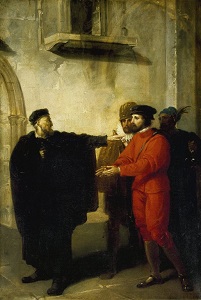
Martin van Amerongen (8 oktober 1941 – 11 mei 2002)
Shylock Rebuffing Antonio door Richard Westall, 1795.
De Amerikaanse schrijver Benjamin Cheever werd geboren op 8 oktober 1948 in New York. Zie ook alle tags voor Benjamin Cheever op dit blog.
Uit: Strides
„It’s odd that I like marathons so much. Ordinarily, I don’t fit in at staged gatherings. The bigger the ceremony, the less festive I feel.
Crammed in with a hundred strangers who are probably as similar to me as other peas in my pod, I feel alienated, unique, and alone. Nor do I have the sort of attitude that leads to lasting connections. Soon, I’m criticizing the filet mignon, speculating out loud about how much they paid the keynote speaker. “And didn’t he already publish this in a column?” A tuxedo brings out the Hamlet in me. There’s something rotten in the state of Denmark.
Set this same cynic down at Fort Wadsworth on line for a toilet that really does smell rotten, and he’s a believer. Suddenly, I respect authority. It was raining the year I saw Mayor Koch striding through a clot of runners at the start of the New York City Marathon, waving his arms above his head as if he’d just won a heavyweight bout. Nobody was cheering.Nobody. I liked him, though. I thought he looked a little silly, but also statesmanlike. This was a man who would not be ruled by the crowd. Seemed he didn’t need us at all.
I like the people at a marathon. Maybe this is because as a species, we’re so good at concealing ourselves. And the signals we give one another are like the feints a ball carrier might use to outwit a tackler. We hate or loveour jobs, depending entirely on who’s listening. We didn’t mean to buy this car. “After circling the globe, I never thought I’d Wind up in this town.”
“I didn’t mean to marry him.”
When you run a marathon, you mean it. We’re built for running. We dream of flying. For now, though, we’re built to run.”
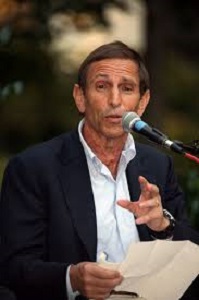
Benjamin Cheever (New York, 8 oktober 1948)
De Duitse schrijver Jakob Arjouni (pseudoniem vanJakob Bothe) werd geboren op 8 oktober 1964 in Frankfurt am Main. Zie ook alle tags voor Jakob Arjouni op dit blog.
Uit:Happy Birthday, Türke!
»’n Abend, Herr Maier-Dietrich. Wie wärs mit ’ner [6] Stunde unter Männern, im Beisein einer Flasche Feuerwasser?«
Er willigte ein, und wir verabredeten uns für später.
»Passen Sie auf, daß niemand aus Versehen auf den Hund tritt«, rief ich ihm hinterher, aber er hatte es wahrscheinlich nicht mehr gehört.
Ich schaute mir ein Dutzend Tote im Fernsehen an und goß das erste Glas Chivas in die Leber. Dann klingelte Maier-Dietrich und hinkte in die Wohnung. Der Russe habe ihm das Bein gemopst, erzählt er mir oft, nicht ohne Witz.
Der Abend war verlaufen wie erwartet. Wir sprachen über Autos, die wir nicht bezahlen, und Frauen, die wir nicht beschlafen konnten. Er sowieso nicht mehr. Später klauten wir dem Gemüsehändler im Erdgeschoß noch zwei Flaschen Mariacron aus dem Keller und waren irgendwann danach bewußtlos in die Betten gefallen.
Ich schlürfte meinen Kaffee und starrte die leere Flasche an. Geburtstag. ›Na ja‹, dachte ich mir, ›wär schon schön, wenn irgend jemand mit Geschenk und Kuchen reinplatzen würde.‹ Mir fiel allerdings niemand ein. Herr Maier-Dietrich konnte aufgrund der letzten Nacht nur schlafen oder tot sein. Im übrigen kann er nicht backen und würde, die gemeinsame Nacht vergessend, mir wahrscheinlich die angebrochene Flasche Mariacron schenken.
Ich holte eine offene Büchse Heringssalat aus dem Kühlschrank und stocherte mißmutig drin herum. Die blaugrau schillernde Haut der Fischstücke glänzte im Sonnenlicht. Eine halbe Flosse lugte zwischen zwei Gurkenstückchen hervor.
Ich schmiß die Büchse in den Abfall, machte eine Flasche Bier auf und zündete mir eine Zigarette an. [7] Irgendwo pfiff ein Wasserkessel, und der Ton schnitt mein Hirn in Scheiben.
Dann klingelte das Telefon. Ich kroch hin und nahm ab.
»Heinzi, bist du es?« kreischte die Muschel. Ich heiße nicht Heinzi, möchte auch nicht so heißen, flötete aber ein fröhliches »Ja«.
»Heinzi, mein Heinzi, ich bin so wahnsinnig glücklich, deine Stimme zu hören. Ich habe gestern den ganzen Abend versucht, dich zu erreichen, aber du warst nicht zu Hause. Weißt du, was passiert ist?«
Ich wußte es nicht.
»Ich war beim Arzt, du weißt schon, und was glaubst du, hat er gesagt, Heinzi? Heinzi?!«
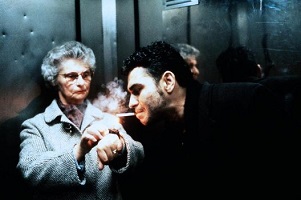
Jakob Arjouni (8 oktober 1964 – 17 januari 2013)
Scene uit de gelijknamige film uit 1992
De Welshe dichter en schrijver John Cowper Powys werd geboren op 8 oktober 1872 in Shirley, Derbyshire. Zie ook alle tags voor John Cowper Powys op dit blog.
Uit: Wolf Solent
“From Waterloo Station tot he small country town of Ramsgard in Dorset is a journey of not more than three or four hours, but having by good luck found a compartment to himself, Wolf Solent was able to indulge in such an orgy of concentrated thought, that these three or four hours lengthened themselves out into something beyond all human measurement.
A bluebottle fly buzzed up and down above his head, every now and then settling on one of the coloured advertisements of seaside resorts-Weymouth, Swanage, Lulworth, and Poole-cleaning its front legs upon the masts of painted ships or upon the sands of impossibly cerulean waters.
Through the open window near which he sat, facing the engine, the sweet airs of an unusually relaxed March morning visited his nostrils, carrying fragrances of young green shoots, of wet muddy ditches, of hazel-copses full of damp moss, and of primroses on warm grassy
Solent was not an ilLfavoured man; but on the other hand he was not a preposssssing one. His short stubbly hair was of a bleached tow-colour. His forehead as well as his rather shapeless chin had a tendency to slope backward, a peculiarity which had the effect of throwing the weight of his character upon the curve of his hooked nose and upon the rough, thick eyebrows that overarched his deeply sunken grey eyes.
He was tall and lean; and as be stretched out his legs and clasped his hands in front of him and bowed his head over his bony wrists, it would have been difiicult to tell whether the goblinish grimaces that occasionally wrinkled his physiognomy were fits of sardonic chuckling or spasms of reckless desperation.
His mood, whatever its elements may have been, was obviously connected with a crumpled letter which he more than once drew forth from his side-pocket, rapidly glanced over, and replaced, only to relapse into the same pose as before.”
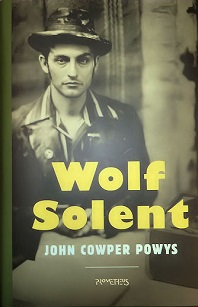
John Cowper Powys (8 oktober 1872 – 17 juni 1963)
Cover
De Russische dichter Sergei Yakovlevich Efron werd geboren op 8 oktober 1893 in Moskou. Zie ook alle tags voor Sergei Efron op dit blog.
On Parting
Mein Herz tragt schwere Ketten.
Die Du mir angelegt.
Ich mocht mein Leben wetten
Dass Keine schwerer tragt
Frankfurt song
Teasing and tempting and playing
We loved like children, us both
But somebody, hiding a smile,
Set up the ungentle nets –
And here we are at the harbor,
Not seeing the wished-for abodes,
But knowing that I will be yours
In the heart, without words, until death.
You told me of all things – so early!
I guessed them so late! In our hearts
A wound is eternal, a silent
Question exists in our eyes,
The desert on earth is so endless,
The heaven, so high, has no stars,
Revealed is the tender secret,
And frost rules for centuries.
I will talk to shades! O my dear,
To forget you I do not have might,
Your visage can’t move under shadow
Of eyelids gone over my eyes…
It’s darkening… Shutters have closed,
On all things descending is night…
I love you, one ghostly-eternal,
And only you – and always!
Marína Tsvetájeva (Vertaald door Ilya Shambat)
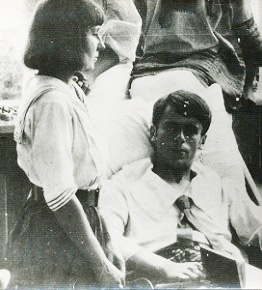
Sergei Efron (8 oktober 1893 – 16 oktober 1941)
Sergei Efron en Marína Tsvetájeva op de Krim
De Franse schrijver en dichter André Theuriet werd geboren op 8 oktober 1833 in Marly-le-Roi. Zie ook mijn blog van 8 oktober 2010 en eveneens alle tags voor André Theuriet op dit blog.
Le Tisserand (Fragment)
Si la navette hésite ou s’arrête en chemin,
La famille n’aura rien à manger demain.
Ô maigre tisserand, ô chétive araignée,
Vous avez même peine et même destinée,
Et dans le même cercle aride votre sort,
Pénible et résigné, tourne jusqu’à la mort.
De l’aube au crépuscule il faut tisser sans cesse ;
Il faut tisser pour vivre, et si la faim vous presse,
Si le besoin roidit vos bras endoloris,
Le travail chôme.. Adieu le réseau de fils gris,
Et la trame légère et souple comme un voile !
Sans toile plus de pain, et sans pain plus de toile..
Votre vie a le même horizon désolant,
Ô chétive araignée, ô maigre tisserand !
À l’approche du soir, l’homme un instant s’arrête.
Il a les reins rompus, sa main tremble, et sa tête
Est lourde. Son regard anxieux et troublé
Contemple le châssis où l’insecte a filé.
Le soleil qui s’éteint dans la brume rougie
Empourpre les carreaux de la vitre ternie..
Au long des grands bois verts et baignés de clarté,
Qu’il serait bon d’errer ce soir en liberté !..
Par l’étroit soupirail, le vent du sud apporte
Des sons lointains de cloche et l’odeur saine et forte
De la terre attiédie et des foins mûrissants..
Qu’il ferait bon dehors ! Heureux les lis des champs !
Leurs fleurs « emmi les prés ne filent ni ne tissent »,
Et toujours leurs soyeux vêtements resplendissent,
Et toujours sans compter Dieu leur donne au réveil
Ses perles de rosée et ses flots de soleil.
Heureux les lis des champs !.. L’homme se décourage
Et n’ose même plus regarder son ouvrage.
L’insecte, sur ses fils immobile, inquiet,
Comme une sentinelle épie et fait le guet.
Jouant dans un rayon, bourdonnante, étourdie,
Dans la toile flexible et savamment ourdie
Une mouche soudain s’enlace et se débat.
Alerte, l’araignée accourt, et le combat
S’engage. La captive est brave et bien armée ;
L’araignée est ardente, implacable, affamée.
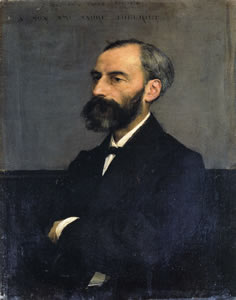
André Theuriet (8 oktober 1833 – 23 april 1907)
Portret door Jules Bastien-Lepage, 1878
De Duitse dichter en schrijver Nikolaus Becker werd geboren op 8 oktober 1809 in Bonn. Zie ook mijn blog van 8 oktober 2010 en eveneens alle tags voor Nikolaus Beckerop dit blog.
Abschied und Wiedersehen
l.
Noch einen vollen Becher
Reich’ mir zur guten Nacht,
Es gelte frohem Siege
Auf morgen in der Schlacht-:
Die schöne Maid behende
Credenzt den dunkeln Wein;
Sie scheint ihn an so freudig,
Wie er ihn schlürft hinein.
Und ist aus blut‘gem Kampfe
Der Feind geflohen weit,
Dein eigen dann, schön Liebchen,
Bin ich für alle Zeit.«
Er zog mit starkem Arme
Sie an die Kriegerbrustz
Es küßt die bärt’ge Lippe
Den rothen Mund mit Lust.
Und hohe Freudenröthe
Der Jungfrau Wange malt,
Wie wenn auf reine Lilie
Der Sonne Frühroths strahlt.

Nikolaus Becker (8 oktober 1809 – 28 augustus 1845)
Bonn
Onafhankelijk van geboortedata
De Amerikaanse schrijver Atticus Lish werd geboren in 1972 in New York. Zie ook alle tags voor Atticus Lish op dit blog.
Uit: Preparation For The Next Life
“I’m comforting you! he yelled, but she shook her head and he let his hand drop.
We’re still crazy, he said. I know we’re crazy.
I cannot hear.
I know, it’s nuts.
There were rainbow lights flowing around the jukebox, which had the image of a saint in the center of the songs.
You love music?
He was looking around them in the loud dark. At the sound of her voice, he looked in her eyes and said oh yeah.
He got her attention and pointed at the high-definition TV over the bar, which was showing a professional boxing match between Mexican fighters in tasseled shorts and boots. He watched her face in profile watching the match.
Nice TV, he yelled.
She nodded seriously, the blue of the ring reflected on her face.
Skinner noticed a man wearing a bandana staring at him. The bartender set another round in front of them.
Hey, let’s see how fast we can drink these. Hey, look!
He drank his beer straight down while she watched.
Now you.
He watched her lean her head back and her throat working as she swallowed the contents of the entire bottle, then she set her empty bottle on the bar next to his.
I don’t drunk.
But you’re getting there.
They had created a little forest of clear glass bottles on the bar.
In the China, the beer is much bigger—this big, big one! She held her hands apart to show their size. I cannot drink them. Here, this small one it’s nothing.”
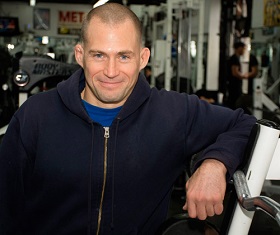
Atticus Lish (New York, 1972)
